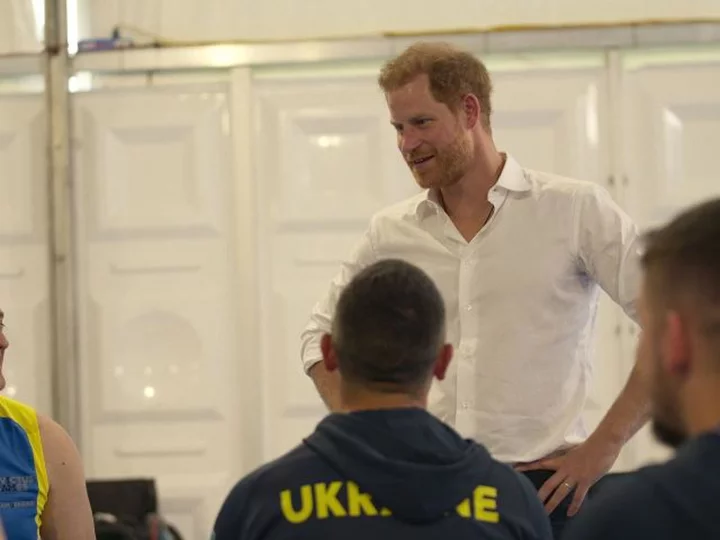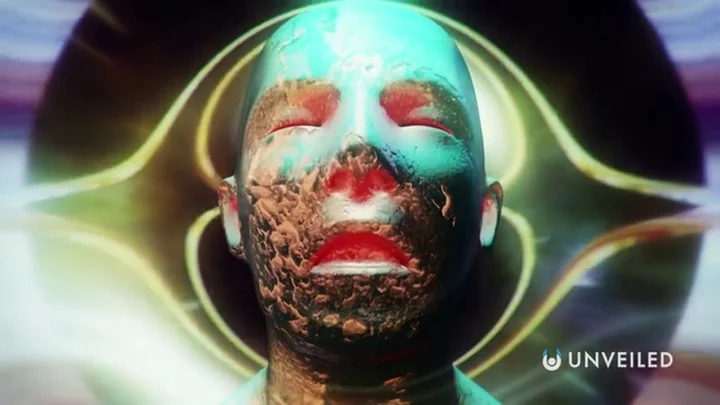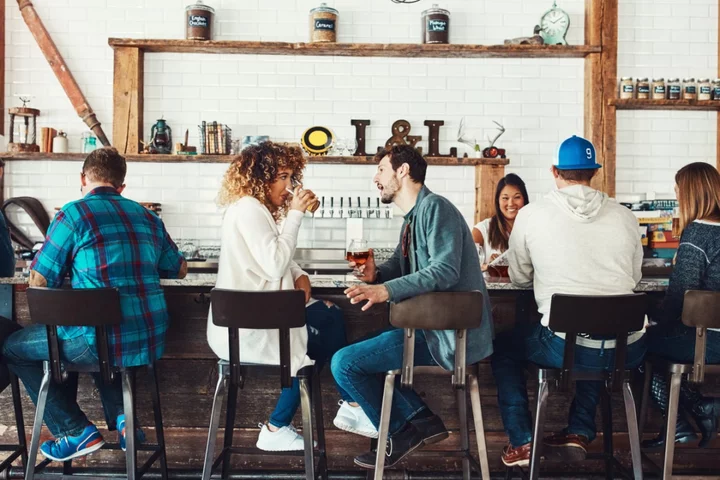
Prince Harry uses his celebrity to champion 'Heart of Invictus'
There is a small strata of Hollywood deal-making where who's behind a project -- and with whom the programmer gets to align itself -- carries more weight than the specifics. That would seem to define Meghan, Duchess of Sussex and Prince Harry's producing arrangement with Netflix, which bears fruit this week with "Heart of Invictus," a docuseries about the games devoted to wounded, ill and injured veterans.
2023-08-30 21:45

Martha Stewart sparks controversy for taking Greenland iceberg to use in a cocktail
Martha Stewart has been criticised for posting a photo of a small iceberg she took from Greenland to use in her cocktails. Posting on Instagram, the TV personality posted on social media about her recent cruise and captioned her Instagram pictures: “End of the first zodiac cruise... into a very beautiful fjord on the east coast of Greenland. “We actually captured a small iceberg for our cocktails tonight.” One commenter said: “So as the climate warms due to the profits of a couple thousand people, billionaires vacation to the melting icebergs, scoop them up and use them to keep their cocktails cold. That sounds like a line from a dystopian novel. Can’t make this s**t up". Another wrote: "Martha the ice caps are melting don’t put them in your drink." However, some people defended her. One wrote: "This is normal on those excursions. The ice is already floating, not part of the ice mass, it is slowly melting in the ocean. Every tour company does it. We did it in Alaska and Patagonia. We did NOT disturb the glaciers." Another said: "I love seeing her enjoy her life". The television personality has been posting lots of photos of her trip online, from photos of a fox from inside a Reykjavík, Iceland volcano, to a sky lagoon in the same area. But if she keeps up with this social media posting, she is bound to get an icy reception. Sign up to our free Indy100 weekly newsletter Have your say in our news democracy. Click the upvote icon at the top of the page to help raise this article through the indy100 rankings.
2023-08-30 20:58

Scientists think there might be life hidden in underground caves on Mars
Scientists have theorised that if we are going to find life on Mars, it will be microbes and they will be living in caves below the surface. The Perseverance rover, NASA’s exploration robot on the Red Planet, is currently searching for signs of ancient life in the Jezero Crater. Scientists already know that there are so-called lava tubes on Mars, which some think could be large enough to shelter the first human astronauts from the cosmic radiation which is bombarding the planet. When these were formed, they thought conditions on Mars were more similar to those on Earth, with flowing water, an atmosphere and a warmer climate. One theory is that as conditions changed on the surface and Mars lost its magnetic field and atmosphere, life could have shifted underground. Daniel Viúdez-Moreiras from Spain’s National Institute for Aerospace Technology calculated that UV radiation levels would be about 2 percent of the radiation levels found at the surface. Fortunately, we have lava tubes here on Earth too, which could tell us what life could look like in similar conditions elsewhere in the Solar System. Hawai’i’s Mauna Loa volcano lava tubes were recently explored by NASA. Within them, life is sheltered from conditions on the surface. On Earth, that is a bad thing: we have sunlight and oxygen. But on Mars, where conditions are much harsher, that is a big advantage. “The microbes we found in Hawaii could be similar to microbes that once lived on Mars,” researcher Chloe Fishman explained to NASA following a trip to collect samples in April, “or even microbes that live there today.” The team brought back samples from the cave so as to sequence the genomes of the microbes they found there. And there are already plans to explore lava tubes on the Moon, too. So maybe, just maybe, they will hold the secret to life on Mars. Sign up to our free Indy100 weekly newsletter Have your say in our news democracy. Click the upvote icon at the top of the page to help raise this article through the indy100 rankings.
2023-08-30 19:48

Near-death experience expert says he’s proven there is an afterlife ‘without a doubt’
One of life's unanswered questions that often lies in fear of the unknown is what happens when we die. Now, an American doctor, who has studied over 5,000 near-death experiences, claims there is "without a doubt" life after death. Radiation oncologist Dr Jeffrey Long from Kentucky started his Near-Death Experience Research Foundation back in 1998 and has collected personal recollections from people who have almost faced death. He defined a near-death experience as "someone who is either comatose or clinically dead, without a heartbeat, having a lucid experience where they see, hear, feel emotions, and interact with other beings." After years of "overwhelming" evidence, he has concluded: "There’s certainly an afterlife." Dr Long revealed in an essay for Insider that roughly 45 per cent suggested that "their consciousness separates from their physical body, usually hovering above," during their NDE. One account from a woman who fell unconscious while riding a horse told the doctor that "her consciousness travelled with her horse as he galloped back to the barn." When she woke up, she was able to "describe exactly what happened at the barn." Many others went on to claim that they felt as though they were "transported into another realm," where they saw a bright light and were greeted by deceased loved ones. Even children have described similar experiences. Dr Long candidly said he hasn't found any scientific explanations behind the experiences, adding: "I’ve read brain research and considered every possible explanation for NDEs. The bottom line is that none of them hold water." Previously, in a short film for BBC Ideas, Dr Kathryn Mannix, who specialises in palliative and end-of-life care suggested: "Dying is probably not as bad as you're expecting." She went on to compare death to "a process" and believes society should be open to the conversation about death and change how we speak about it. Sign up for our free Indy100 weekly newsletter Have your say in our news democracy. Click the upvote icon at the top of the page to help raise this article through the indy100 rankings.
2023-08-30 18:54

Mauricio Pochettino makes pledge to Chelsea academy players
Mauricio Pochettino says he will work to ensure more Chelsea academy graduates have a pathway to playing first-team football at Stamford Bridge.
2023-08-30 18:45

Marketmind: Cooler labor warms markets
A look at the day ahead in U.S. and global markets from Mike Dolan The red hot U.S. jobs market
2023-08-30 18:23

Premier League London derby table - 2023/24
The 2023/24 Premier League London derby table.
2023-08-30 16:17

Oppenheimer filming was cut do 57 days to free up funds for huge set costs
Christopher Nolan ended up with just 57 days to wrap filming 'Oppenheimer'.
2023-08-30 15:25

How can I improve my teenager’s low mood?
If there’s one thing associated with teenagers more than anything else, it’s moodiness. But although low mood is extremely common in teens, what’s just as common is that parents don’t know what to do about it. Adolescence is the highest risk period of life to experience depression, and half of adult mental health disorders start before the age of 15, says consultant clinical psychologist Dr Beth Mosley, who provides specialist mental health support to children and their families. “Seeing the signs of low mood in your teen can be worrying if you’re a parent,” she says. “The questions you may ask are likely to be, what are the usual highs and lows of adolescence, and what is something to worry about? Why might my teen be struggling with low mood, and most importantly, what can I do as a parent to help if my teen is feeling down and showing signs of disengaging with life?” Mosley, the author of new book, Happy Families, which is about the most common issues affecting children’s mental health and how parents can help, says although everyone will, at some point, experience low mood, sadness, irritability and loss of interest in things they enjoy, usually such feelings are linked to problems in life. But changes associated with puberty, and brain restructuring, mean adolescents are especially vulnerable to mental health problems, says Mosley, who explains: “These changes increase the possible impact of life stressors and, thus, their vulnerability to mental health difficulties. “The brain changes in adolescence mean teens feel emotions more intensely – both the highs and lows – meaning it’s not unusual to see them experiencing waves of low mood, particularly in the face of challenges.” She says if a teen’s low mood doesn’t go away, and prevents them doing the things they need to, like schoolwork and spending time with others, it would be wise to consider seeking help. The teen’s school may be able to suggest local support. But she adds: “Whether your teen experiences passing or more persistent low mood, the good news is that the brain is flexible and ripe for learning in adolescence, so there’s a lot we can do to support our teens when they’re experiencing low mood. “Importantly, this support will likely improve your relationship with your teen, and help protect them from developing mental health difficulties in adulthood.” If your teenager’s mood is low, these are the things Mosley says might help them… Encourage them to do what’s important to them When someone feels low, they tend to do less of what’s important to them, meaning they get less rewards from life and feel lower, Mosley explains. This is the low-mood cycle. Conversely, by doing more of what’s important to them regularly, they get more reward from life and start to feel better – this is the feel-good cycle, she says. So rather than a teen waiting until they feel better to do the things that are important to them, low-mood teens should do them now to break the low-mood cycle. “Determining what activities they can do more of and what unhelpful activities to do less is a key first step,” says Mosley. “You can support your child by providing more opportunities to do what’s important to them and increasing access to rewards. Give them practical support to do the activities they enjoy, provide encouragement.” Communicate better with them Mosley says that low mood can make it difficult for teens to communicate, but parents learning key communication skills can support how they communicate with their teens and, in turn, help improve their mood. She says being careful how you say things, through tone of voice and nonverbal body language, is important, as teens are more sensitive to criticism and negative social feedback. But there are six communication skills in particular that parents should try to use. They are… Picking the right time to have a conversation. “Open and honest conversations are most likely to happen when we’re feeling calm and not under pressure,” says Mosley, explaining that it’s important to be aware of when your teen isn’t in the right frame of mind for a difficult conversation, and to learn to respectfully pause the conversation and reschedule it for a better time. Starting a sentence with ‘I’ rather than ‘You’ can make a huge difference, explains Mosley, who says starting with ‘You’ often has a blaming tone and makes the teenager defensive and stops them from listening, whereas starting with ‘I’ can explain how you’re feeling, which can’t be disputed and starts a whole different conversation. Instead of over-generalising and using words like ‘always’ or ‘never’, Mosley says it’s much better for parents to be specific and provide an example of a recent event, rather than things that have happened over months or years. She says over-generalising is more likely to make teens feel awful, and less likely to spark a collaborative conversation. Imagining how a young person might feel in/about a certain situation can also help, she says. “Understanding someone else’s point of view, and expressing this to them, can make it easier to have a collaborative conversation and avoid an argument,” she explains. “When we’re particularly worried about our children, thinking about how they feel can sometimes help us connect with them.” If you go into a conversation with your child knowing what you want from it but being aware you might not get it, be prepared with some alternative solutions, Mosley advises. “Having a few solutions in your back pocket before you go into a discussion enables you to show you’re willing to compromise so you don’t get stuck in a stalemate situation,” she says. Although you may not initially get the response you hoped for from your child when you try a new way of communicating with them, it’s vital to persevere, stresses Mosley, who explains: “With these communication hacks we should begin to see communication with our children become healthier and more productive.” Tackle your negative thoughts and help your teenager do it too Mosley advises parents to reduce the habit of getting stuck in negative thinking by trying these tactics, which she suggests should be shared and modelled to teens. Remember it’s just a thought and it doesn’t mean it’s real. “Remind your teen that thoughts are not facts, they are ideas and they don’t predict the future,” says Mosley. Let negative thoughts come and go, rather than fixating on them and becoming overwhelmed, she advises, and take the power out of the thought by sharing it with others. “Getting another viewpoint can stop unhelpful thoughts growing in magnitude,” she says, and suggests parents provide opportunities for teens to share their thoughts with them, on car journeys and walks etc. As many young people get stuck on social media, dwelling on distressing thoughts, Mosley suggests: “Help your teen notice this cycle and learn the art of moving to another activity, even if it’s just moving to a different room or doing some physical activity.” She adds: “If your teen is feeling negative and self-critical, move away from nagging and towards helping them refocus their energy on something they enjoy and/or resolving the underlying problem.” Happy Families: How to Protect and Support Your Child’s Mental Health by Dr Beth Mosley is published by Bluebird on August 31, priced £18.99. Read More Charity boss speaks out over ‘traumatic’ encounter with royal aide Ukraine war’s heaviest fight rages in east - follow live Maya Jama and Stormzy: Can you make it work with an ex? 12 smart ways to save money on everyday back-to-school costs 9 ways to make dark rooms look lighter
2023-08-30 15:24

Diane Franklin loves the 'emotion' of horror movies
Diane Franklin loves the "emotion" of horror movies as she explains the mother-daughter relationship in her latest project.
2023-08-30 15:17

Drinking alcohol does not result in ‘beer goggles’ making people look more attractive, study says
When it comes to approaching someone you like at a bar, it may be more a case of alcohol giving you liquid courage than “beer goggles”, researchers say. A new study suggests drinking alcohol makes people more likely to approach someone they already find attractive, but does not make others appear more attractive. Some people argue that intoxication makes others seem better-looking – but according to the researchers, this has not been systematically studied. Past research typically had people simply rate others’ attractiveness while sober and while intoxicated based on photos. But the new study added the possibility of meeting the people being rated. The study, led by Molly Bowdring of the Stanford Prevention Research Centre, Stanford University, in the USA (affiliated with University of Pittsburgh at the time of this study), and her dissertation adviser, Michael Sayette, involved 18 pairs of male friends in their twenties. The men were brought to the laboratory to rate the attractiveness of people they saw in photos and videos. They were also told that they may be given the chance to interact with one of those people in a future experiment. After the ratings were given, the men were asked to pick those who they would most like to interact with. Pairs of men visited the lab on two occasions – on one occasion they both received alcohol to drink – up to about a blood alcohol concentration of .08 per cent, the legal limit for driving in England, Wales and Northern Ireland, and the United States, and on the other occasion, they both received a non-alcoholic drink. Friend pairs entered the lab together in order to mimic social interactions that would typically take place in a real drinking situation. The researchers say they did not find evidence of beer goggles – whether or not the men were intoxicated had no effect on how good-looking they found others. Professor Sayette, from the University of Pittsburgh, said: “The well-known beer goggles effect of alcohol does sometimes appear in the literature, but not as consistently as one might expect.” However, according to the findings, drinking alcohol may affect how people react to those they find attractive in a different way. The researchers found it impacted how likely the men were to want to interact with people they found attractive. When drinking, they were 1.71 times more likely to select one of their top-four attractive candidates to potentially meet in a future study compared with when they were sober. The researchers suggest alcohol may not be altering perception but rather enhancing confidence in interactions, giving the men liquid courage to want to meet those they found the most attractive. According to the researchers, the findings could have implications for therapists and patients. Prof Bowdring said: “People who drink alcohol may benefit by recognising that valued social motivations and intentions change when drinking in ways that may be appealing in the short term, but possibly harmful in the long term.” The findings are published in the Journal of Studies on Alcohol and Drugs. Read More Yewande Biala thought she was unique in never having had an orgasm – then she made a film about it The dish that defines me: Evelin Eros’s rum cake Woman adopts husband’s ex-wife’s son after growing up in foster care herself Charity boss speaks out over ‘traumatic’ encounter with royal aide Ukraine war’s heaviest fight rages in east - follow live
2023-08-30 15:15

Taylor Swift jokingly references infamous Kanye West VMA's interruption during Era's tour
Taylor Swift appeared to jokingly reference the infamous moment Kanye West interrupted her VMAs speech back in 2009 during her recent Eras tour show. The 33-year-old pop star performed four shows at the 65,000-capacity Foro Sol in Mexico City, and during the piano moment for the ballad 'Champagne Problems,' the crowd showed their love for Swift by repeatedly chanting her name on Sunday night (August 27). In clips circulating online, Swift can be heard saying in response: “It’s the best way to be interrupted, by the way, just people chanting your name. “It’s really the only way to be interrupted… and I would know.” @sussan_mourad @Taylor Swift jokes about Kanye West interrupting her MTV VMAs speech at Eras Tour Mexico City! ?? #taylorswift #taylorswifterastour #erastour #taylorswift #tserastour #kanyewest #ye #taylorandkanye #erastourmexicocity #tserastourmexicocity #mexicocityerastour #celebritynews #entertainmentnews #taylorvmas #kanyeandtaylor #sussanmourad It appears the 'Anti-Hero' singer is referring to when she won Best Video by a Female Artist at the 2009 MTV Video Music Awards, for 'You Belong With Me.' But upon starting her acceptance speech, West - also known as Ye - stormed the stage and interrupted Swift by grabbing the microphone from her. “Imma let you finish, but Beyoncé had one of the best videos of all time! One of the best videos of all time!" he said, referring to her 'Single Ladies' music video. This instantly became a meme and was the start of Swift and West's feud which inspired different songs over the years. One example of this is Swift's song called 'This Is Why We Can't Have Nice Things,' from the 2017 album 'reputation' which is rumoured to be about West. On the album, Swift sings "And here's to you / 'Cause forgiveness is a nice thing to do,'" before she laughed at the idea and confessed, "I can't even say it with a straight face." It was reported that when Swift sang this song on the Eras Tour back in July as part of the surprise acoustic set in the show, she couldn't keep in her laughter, taking a momentary pause before singing the rest of the track. Elsewhere, a round-up of all the Taylor's Version songs teased on Prime Video, Swifties react to a snippet of 'Look What You Made Me Do' (Taylor's Version) and Viral singing Taylor Swift concert security guard 'fired'. Sign up to our free Indy100 weekly newsletter Have your say in our news democracy. Click the upvote icon at the top of the page to help raise this article through the indy100 rankings.
2023-08-30 14:25
